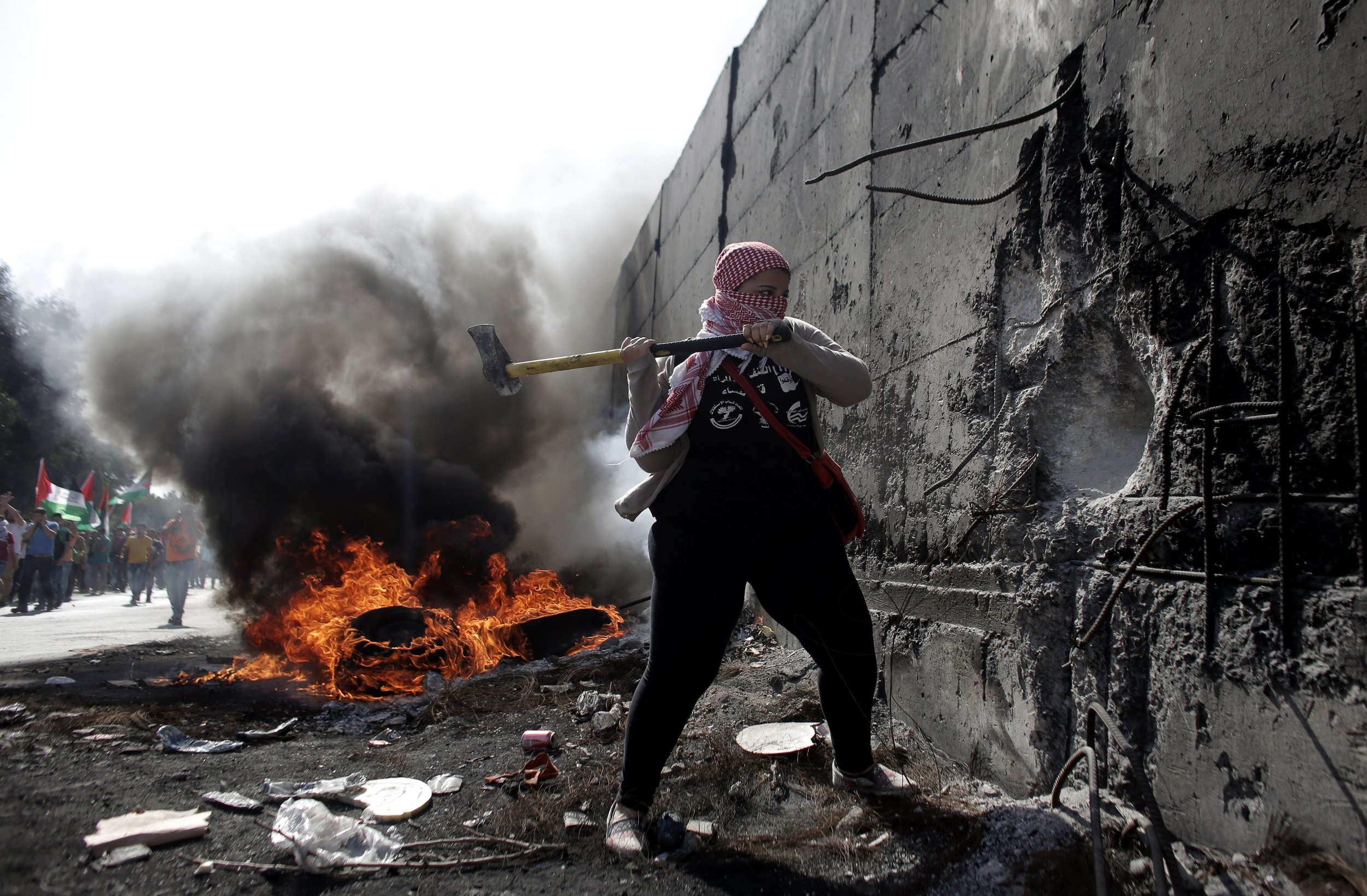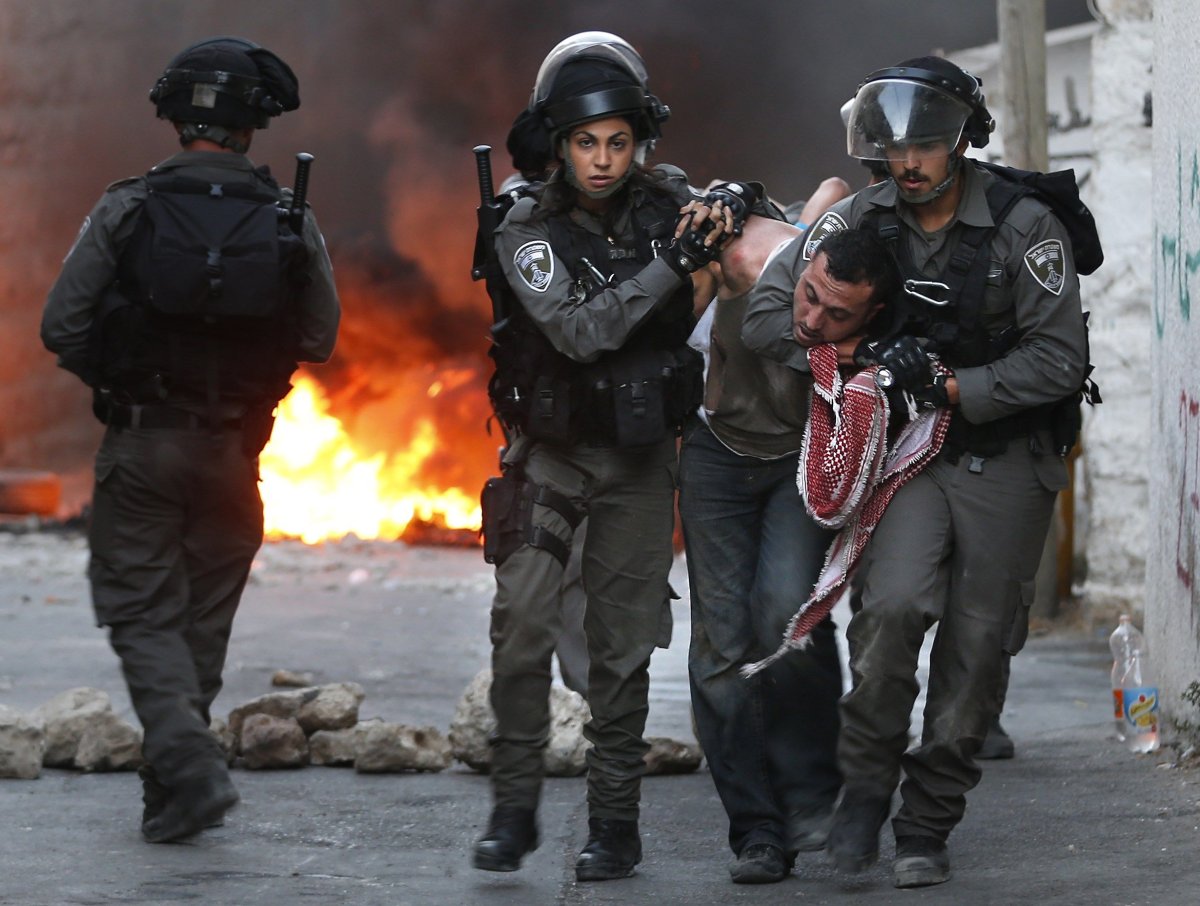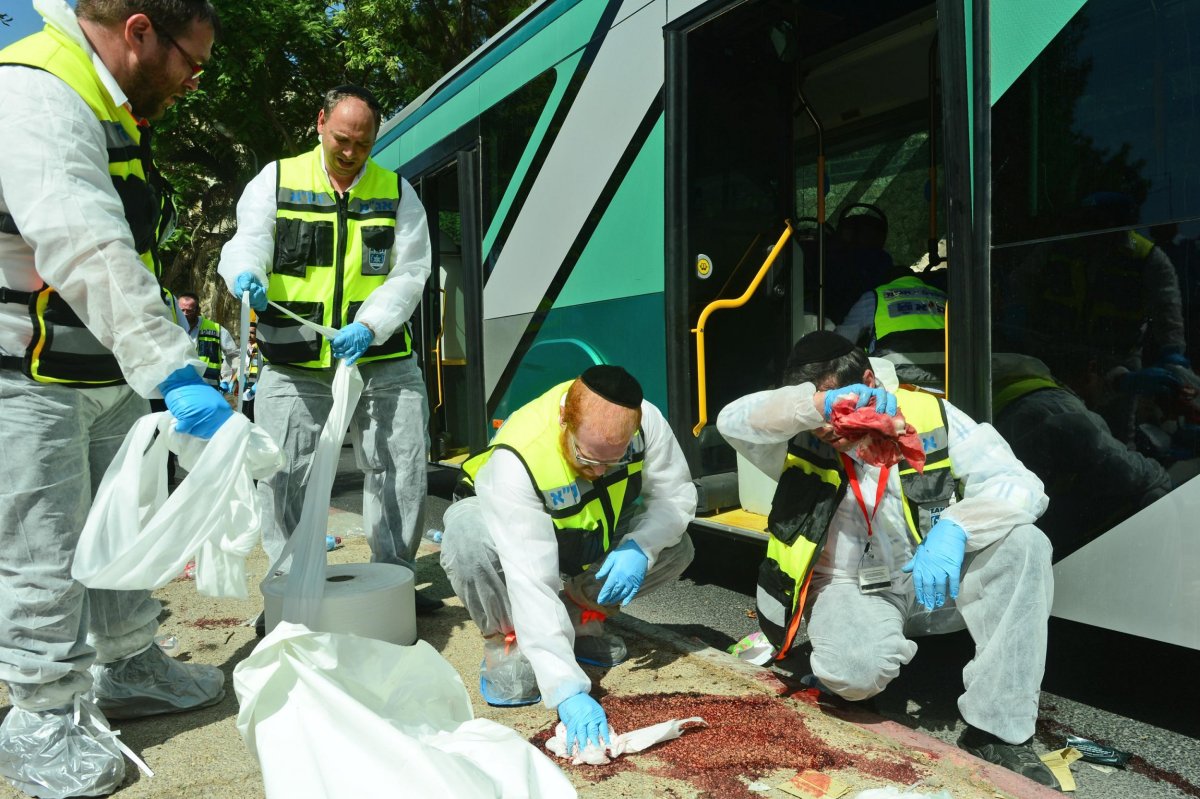
In October 2015, a new streak of violence flared up between Israelis and Palestinians, adding another dimension to the decades-long conflict. This time, there were none of the suicide bombings that symbolized the Second Palestinian Intifada, or uprising, of 2000 to 2005, nor any of the rocket attacks that precipitated the 2014 Gaza conflict. Instead, the violence has taken the form of unpredictable and undetectable stabbing attacks.
Termed the "Stabbing Intifada" by the international media, lone Palestinians are taking to the streets of Israeli cities and areas near Israeli settlements in the West Bank—which are considered illegal by much of the international community—to stab Jewish citizens. Adding in various car-ramming and shooting attacks, Palestinians have killed at least 28 Israelis and two U.S. nationals at the time of writing.
The most high-profile attacks include an Arab-Israeli shooting two people dead at a Tel Aviv restaurant; a Palestinian killing one U.S. national and injuring 10 more in a stabbing attack in the port town of Jaffa; and a Palestinian stabbing a mother of six to death in the West Bank settlement of Otniel.
On the other side of the conflict, Israeli forces shot at protesters in the West Bank and the Gaza Strip as Palestinian anger began to boil over from October onwards in a series of "Days of Rage." In response to the attacks on Israelis, the country's security forces have been shooting dead or injuring Palestinians targeting Israeli civilians or soldiers. Israeli forces have arrested the majority of suspected attackers and have pre-emptively stopped several by using lethal force. By mid-March, Israeli security forces had killed 184 Palestinians, 124 of whom they say were attackers. According to Israel, the other 60 were killed during violent protests.
B'Tselem, the left-wing Israeli organization that monitors Israeli violations in the West Bank, has criticized Israeli forces for what it calls the "extrajudicial killing" of Palestinian attackers instead of arresting them. The West Bank-based NGO Defense for Children International reported in February that, of the 184 Palestinians killed by Israeli forces , 41 were children—17 of them girls—and 31 of those children had carried out attacks against Israelis.
Known as the Oslo Generation because they were born after the Oslo peace accords which divided up the West Bank were drafted in 1995, young Palestinians are getting increasingly involved in the violence. One statistic shows that in the first ten days of October 2015 alone, all but two of the 21 Palestinians killed were younger than the age of 23.
What is clear is that Palestinians of all ages and genders are carrying out violent attacks against Israelis, at great risk to their own lives. They also risk the livelihoods of their loved ones: Israel recently revived its policy of demolishing an attacker's family home, despite the act being defined as illegal under international law and criticized as collective punishment by human rights groups.
So why do Palestinians continue to carry out these acts, knowing the likely cost to their lives and their families?

Many of the attackers come from east Jerusalem, an area of the holy city captured and occupied by Israeli forces in the 1967 Six Day War. Israel has steadily built a series of Jewish communities known as settlements in this area that, which the majority of the international community considers to be illegal.
In response to Palestinian attacks during the Second Intifada, Israel began construction on a separation barrier it said was to prevent Palestinian suicide bombers and boost Israeli security. Israel says that in the years since the structure was started, it has prevented many deadly suicide bombings. According to the U.K.-based Council for Arab-British Understanding, the wall—almost two-thirds of which is now built—will run a distance of 712 kilometers, with 85 percent of the structure running through the West Bank, rather than along the Green Line.
The Green Line is the armistice line set out after the 1948 Arab-Israeli War between Israeli and Arab forces. It serves as a reminder of the division between these two peoples, creating the State of Israel while becoming a seemingly invisible border for the stateless Palestinians. The territories beyond the Green Line fell under Israeli jurisdiction after it captured the West Bank and Gaza Strip from the Jordanians in the 1967 Six Day War. This territory is not recognized by the international community as Israel proper.
The wall also cuts through Jerusalem, which Israeli leadership calls the united and undivided capital of Israel. But inequality pervades this area of the city.
The wall has cut off some 100,000 east Jerusalemites from the Jerusalem municipality, which provides basic services such as waste collection. Palestinians and anti-Israel activists call it the Apartheid Wall.
East Jerusalem Arabs are offered the chance to accept Israeli nationality but many choose not to for political reasons and therefore cannot vote in the country's elections. Unemployment rates are high: 75 percent of east Jerusalemites, who make up 37 percent of the holy city's population, live below the poverty line and only 64 percent are connected to the city's water infrastructure, according to a report released last year by the Association for Civil Rights in Israel.
Many Palestinians are also concerned about a holy site in Jerusalem known to Jews as the Temple Mount, the holiest site in Judaism, and to Palestinians as the Noble Sanctuary, or Haram al-Sharif, the third-holiest site in Islam.
Under a longstanding agreement between Islamic authorities and Israel, the site is controlled by a Palestinian-Jordanian Waqf, or Islamic trust, that ensures the status quo at the site. That includes the clause that Jews are forbidden from praying at the religious site. Right-wing Israeli groups who want to change the status quo to allow Jews to pray at the site have entered the compound, and, in August, some lifted Israeli flags.
Palestinian fears that the right-wing Israeli government, influenced by this section of society, will attempt to change the rules at the complex prompted violent clashes between Israeli forces and Muslim protesters. The clashes coincided with the Jewish high holidays in September 2015 and began after Israeli Defense Minister Moshe Yaalon outlawed two Muslim civilian groups known as the Mourabitoun (defenders of Islam), who say they volunteer to protect the complex from Jewish extremists. Israel says the protection groups provoke clashes with Israeli forces.
After the onset of the initial clashes, Palestinians said Israeli forces entered the complex first, firing rubber-coated bullets and stun grenades. Israeli authorities said they had information that Muslims were planning to attack Jewish visitors, so acted to stop them and to seal off the Al-Aqsa Mosque, where protesters were throwing stones and fireworks.
Israel later imposed visitor restrictions on the site, including installing metal detectors in the Old City and, in October, banning men below the age of 45 from entering the complex for Friday prayers, the most restive day in the Old City.
Israel says it has no plans to alter the status quo and that Palestinian leaders are spreading rumors to feed tensions in the area. But some members of the Israeli government have used rhetoric that contradicts the party line. Deputy Foreign Minister Tzipi Hotovely, for example, said that her "dream is to see the Israeli flag flying over the Temple Mount." She was rebuked by the office of Israeli Prime Minister Benjamin Netanyahu.

Ultimately, Israel says that such clashes and the violence witnessed over the last six months are driven by the Palestinians' hatred for Jews and their denial of the Jewish right to a homeland. The Israeli leadership says that attacks are fuelled by incendiary language espoused by the Palestinian leadership, including President Mahmoud Abbas, Palestinian media outlets, and individuals on social media. Israel says it is unwilling to make concessions to the Palestinians for security reasons and says that it does not have a partner for peace among the Palestinian leadership.
Palestinians say the attacks are in fact driven by a desperation caused by Israel's 49-year military occupation in east Jerusalem and the West Bank, and the ongoing blockade of the Gaza Strip, pushing Palestinians of all ages to strike out against Israelis. They are angered by the lack of progress towards a peace settlement to secure their rights, which they blame on Israel's refusal to allow a sovereign Palestinian state on its borders.
The Palestinian leadership says that Netanyahu has zero interest in negotiating a two-state solution. It says he is instead working towards a one-state reality—where Palestinians would not have equal rights—through the continued expropriation of West Bank land and the transfer of more Israeli settlers into Jewish West Bank communities. This, say Palestinians, will create further bantustans and essentially end Palestinian hopes of a contiguous state that includes the Gaza Strip, the West Bank and east Jerusalem.
Polls show that the Palestinian street has also lost faith in Abbas's ability to deliver any meaningful concessions from his "diplomatic Intifada"—an attempt to achieve self-determination through all of the legal and political channels at their disposal under international law—and in the international community's commitment to a realistic peace initiative.
Neither side shows any sign of yielding its position and, so, both the occupation and the violence show no sign of abating.
Correction: This article originally stated that Israeli forces have shot dead or injured "any Palestinian" suspected of planning an attack against Israelis. It has been amended to reflect that Israeli forces have preemptively arrested the majority of Palestinians suspected of planning an attack.
The article originally stated that East Jerusalem Arabs cannot vote in Israeli elections. It has been amended to reflect the fact that they are offered Israeli citizenship but many choose not to for political reasons. That makes them ineligible to vote in the elections.
Uncommon Knowledge
Newsweek is committed to challenging conventional wisdom and finding connections in the search for common ground.
Newsweek is committed to challenging conventional wisdom and finding connections in the search for common ground.
About the writer
Jack is International Security and Terrorism Correspondent for Newsweek.
Email: j.moore@newsweek.com
Encrypted email: jfxm@protonmail.com
Available on Whatsapp, Signal, Wickr, Telegram, Viber.
Twitter: @JFXM
Instagram: Read more
To read how Newsweek uses AI as a newsroom tool, Click here.








